Reading an article on Maximilien Robespierre published in the New York Review of Books (23 June 2022) has led me to reflect (or more accurately, further reflect) on both my short time as an active member of a far left political organisation in New Zealand in the early 1970s and the state of the wider left today.
Reader beware: this is a bit of a hopefully not tortuous personal journey. As a young Victoria University student I was National Party leaning and looking for a campus National Club to join only to discover that it had been taken over by members of the Socialist Club.
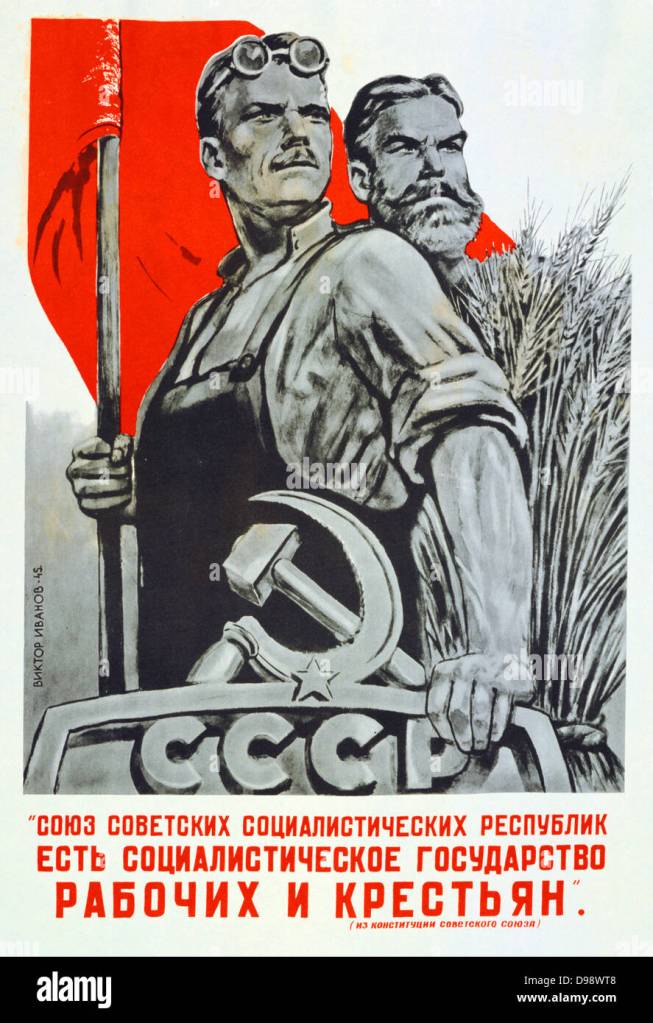
Oh what a day! Victoria University National Club calls for workers and peasants soviets in Aotearoa New Zealand!
Under its new ‘leadership’ the National Club then issued a public call for the establishment of workers and peasants soviets in New Zealand. This attracted much bemused media interest, including television. Few things have tickled my fancy more than this.
Turning to the far left
However, it was the horrors and devastation of both the American war in Vietnam and apartheid South Africa that turned me first away from my conservative leanings and then towards the left and then quickly towards the far left.
Although only a member of the Trotskyist Socialist Action League for three years, it significantly defined my understanding of the world we live in and why it is what it is. It enabled a qualitative transformation of my political consciousness.
Of the far left groups at that time, especially Maoists, I found the SAL much less sectarian. I was attracted to its much more broad front approach.
Nevertheless sectarianism was still evident, particularly towards the rest of the far left (a mutual sentiment).
I struggled with this. I quite liked and respected them. At one point I wrote a conference discussion paper titled something like ‘Personal Sectarianism: A Malignant Disease’.
Need for a wider lens
Eventually I left through a sense of frustration that my cognitive thinking was being too narrowly constrained. I wanted to interpret the world through a wider lens.
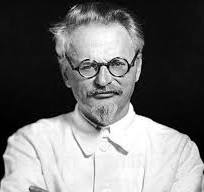
Leon Trotsky: much of his analysis still relevant today but a wider lens still needed
This was not an abandonment of many of the premises of Trotskyism. Even today I still find Trotsky’s writing on fascism and uneven and combined development, for example, very relevant to my thinking and writing.
But I wanted to expand my thinking beyond this and in a non-sectarian way. Socialist intellectuals whose writings have subsequently helped widen my horizons include:
- Antonio Gramsci’s thinking on hegemony;
- Ralph Miliband on the state in capitalist society and parliamentary democracy;
- Edward Thompson’s approach to class as a relationship rather than a thing and the link between class struggle and class consciousness; and
- Boris Kagarlitsky’s astute observations on the dialectical relationship between reform and revolution.
Going beyond the left and no regrets
But it was also important to expand understandings beyond the left. The New York Review of Books has been a stimulating pleasure as has some considered conservative writers such as journalist and historian Max Hastings.

Heather Roy: reaching across the political divide
I have also valued reaching across the broad political divide in order to engage over whether common ground be found on particular issues.
I did this with my political opposite, former ACT MP and deputy leader Heather Roy over a joint paper on making patient-centred care the cornerstone of our health system: If you don’ take the temperature you can’t find a fever (31 January 2023).
However, I don’t regret that involvement in the Trotskyist movement. Its approach to self-disciplined organisation was helpful although probably I learnt more on that front from my mother.
I continue to respect my comrades of that time (most of whom have subsequently also left; a small number expelled), and believe that its broader principles are embedded within my political consciousness. They are just not its totality.
In lighter moments I sometimes observe that I wore shorts then but now wear long pants (a tad silly but there is a message somewhere in these words).
Two, Keith Locke and Matt Robson, became respected MPs for the Greens and Alliance respectively (the latter also a cabinet minister).
I have no regrets over my involvement in the organised far left although relieved it was not any longer than what it was.
I’m also proud of my collection of works by Marx, Lenin and Trotsky (and many other socialist thinkers) that reside in my study. It is a quiet place of peaceful reflection.
Thesis, obscure antithesis and synthesis
So what has all this got to do with Maximilien Robespierre? In terms of dialectics, the thesis is quite a lot, the antithesis is obscure, and the synthesis of sorts follows below.
The New York Review of Books article (paywalled) was by Lynn Hunt, Distinguished Professor of History at the University of California (Los Angeles): The people and Robespierre.
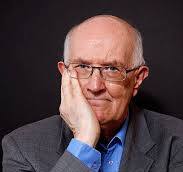
Marcel Gauchet, controversial, now conservative, French historian
It was a review of a book by French historian Marcel Gauchet titled Robespierre: The Man who Divides Us the Most. Gauchet is a controversial historian whose politics have over the years migrated from the left to the right.
Robespierre was the leader of French Revolution in the period 1793-94. Had it not been for one Napoleon Bonaparte coming to power and been involved in war against much of Europe from 1799 to 1815, so the argument goes, Robespierre would have been France’s most controversial figure of that time.
Fearing that he would turn on them, Robespierre’s fellow deputies in the National Convention that governed France from 1892-95, ordered his arrest in 1794.
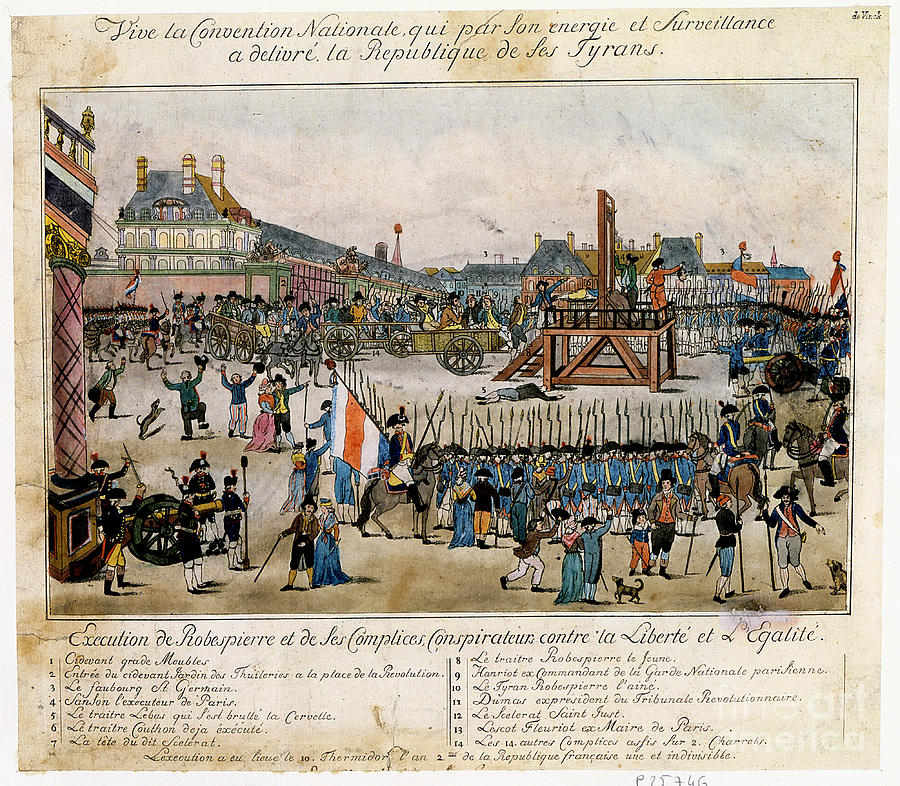
Robespierre’s execution
This had followed Robespierre driving through an infamous ‘Law of Suspects’. After an escape and recapture he was promptly executed in public when he was only in his late-30s.
Gauchet describes how a young (born in 1758) “…unprepossessing, previously unknown lawyer came to incarnate the Revolution in its most intense period?”
In late 1792 the previously “unprepossessing” Robespierre concluded that “In order to form our political institutions, we would need to have the morals that one day they ought to give to us.”
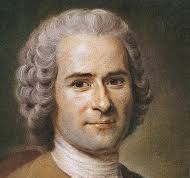
Robespierre took inspiration from Jean-Jacques Rousseau
This had origins in Jean-Jacques Rousseau’s Social Contract (1792) when he advocated for a ‘supreme legislator’.
Hunt argues that Robespierre had rejected democratic processes and become more autocratic “…because he could not imagine that a political party was anything other than a particular interest, and therefore it was incompatible with the general will of the people.”
Similarities within worlds of difference
Robespierre’s adaptation of Rousseau’s ‘supreme legislator’ has cause me to further reflect on political parties of the far or revolutionary left.
The politics of the French Revolution was so dynamic, so bitterly contested, and the forces of counter-revolution so determined, that Robespierre and his followers increasingly became a sectarian bubble isolated from the popular will.
Inevitably this sectarianism led to the influential and popular Robespierre becoming less influential and more vulnerable.
There is a world of difference between the turbulent politics of the French revolution and the left in Aotearoa New Zealand. To begin with we are nowhere near a pre-revolutionary situation, let alone revolutionary.
By left-wing I mean something different to the way the descriptor is often used. I mean being transformational, either by reformism, revolution or both, depending on circumstances. I have discussed this previously in Political Bytes (30 April 2023): What does being left-wing really mean?
There is also a world of difference between the revolutionary sectarianism of the far left in the 1970s and the revolutionary French sectarianism of the 1790s. The closest the former got to the executions of the latter were obscure expulsions.
The similarity is that sectarianism’s origins includes living in bubbles divorced from popular will and akin to ever decreasing circles.
A word that should never have been invented
The far left of today is a mere whisper of that in the 1970s. But sectarian bubbles are unfortunately evident in the wider political left. I refer to the messy and rather artificially constructed debate between class and identity politics.
In my view the word ‘woke’ should never have been invented as I have previously discussed in this blog (9 October 2023): Make war on the word ‘woke’ .
Politics in New Zealand would benefit from a healthy debate on the relationship between class and identity politics. I regard them as interconnected and supplementary rather than opposites.
However, throwing the unsubstantiated ‘woke’ into the mix guarantees repeating the similarity between Robespierre and the ‘supreme being’ sectarian bubble of the French Revolution and the sectarian bubble of far left New Zealand politics in the 1970s.
Ian Powell was Executive Director of the Association of Salaried Medical Specialists, the professional union representing senior doctors and dentists in New Zealand, for over 30 years, until December 2019. He is now a health systems, labour market, and political commentator living in the small river estuary community of Otaihanga (the place by the tide). First published at Political Bytes





Ah … That takes me back. One reason I avoided the far left was the fact that they seem to concentrate more on arguing about who was the most ideologically pure than actual practical politics. If my memory serves, not many of them were workers either, although I’m willing to be corrected on that – I didn’t know all of them.
Thank you for an excellent article. For those wanting to understand Leon Trotsky thoughts, I would recommend reading Paul Le Blanc book on him. It is easier to understand the Trotsky motivation from others rather than to plow through Trotsky’s own works.
What stymied the revolution was the need for the PMC (or secretariat in Trotsky’s description). You cannot transform the peasantry into collectives without guidance and rules.
Problem was that the peoples parliaments (soviets) were supposed to be the rules setters for the PMC to follow. That never happened (thanks to Stalin) and the method to control to peasantry was the gulag. Or for the french, to lop a few heads.
Nowadays the PMC uses “woke” to control the peasants. You will never reach socialist utopia whilst the secretariat (PMC) is in charge. I include the judiciary in the PMC as they are the tools for the PMC to maintain control along with “woke” cancel culture.
Now the anarchist or socialist will say we need the peoples parliament; but how will they function without the PMC? They cannot so how will the PMC be kept as servants not masters?
For the PMC rules the peoples parliament, not our elected representatives (no matter which party is in charge of the treasury benches). Sure they make it look like our representatives are in charge but in actuality the PMC is a master at the game of deception.
I agree. Fortunately, I was innoculated against Trotskyism through fortuitous early exposure to British socialist feminism and libertarian socialism, so I kept my distance from them through my university days. I didn’t tend to think much of them, except appreciate them for turning up to bulk up the numbers during anti-apartheid, abortion rights and LGBTQI+ rights demos during the eighties. And then I got into conflict with the Socialist Action League during the Gulf War over their cackhanded “Anti-Imperialist” approach to Iraq and refusal to engage in any critical analysis of Saddam Hussein and Baathism. For much the same reason (I’m gay), I was rather cool on their cultish admiration for Fidel Castro’s Cuba. Fortunately, that was about the time that the USSR went bung and marxist-leninism in general dead-anted.
It’s quite amusing watching libertarians go through exactly the same paroxysms of sectarian recrimination and mutual excommunication, primarily because the Cult of Ayn Rand imported the whole psychological apparatus of Maoism and simply inverted its ideological orientation ie anathematise your ideological opponents and excommunicate anyone who isn’t a true believer. There’s a lot of bad faith going on when they accuse the whole left of politically correct behavioural control, y’know.
As for the whole “Woke” thing, I’ve noticed that it’s frequently resorted to by abject populists, whose mental processes can be summarised thuswise: “I will repeat this word Woke like a mantra and avoid exposing my unsubstantiated prejudices and biases to factual verification and critical inquiry and hope no-one realises that I’m actually a lazy bastard who can’t think for themselves.”
And the identity politics v class false dichotomy? Frankly, these folks need to read their Gramsci more. Hegemony. Neoliberalism grabbed control of capitalist states because it colonised its institutions and political parties. It isn’t just about class, because neoliberalism has just as destructive effects on other social constituencies than working class individuals. Take LGBTQI+ rights, for instance. I watched aghast as millions of gay and bisexual men died during the US HIV/AIDS epidemic because the United States didn’t have a proper public health infrastructure, which reinforced my socialist inclinations no end. It’s the same with socialist feminism, class and abortion rights- working class women were the ones who died from backstreet abortions under anti-abortion laws. In the United Kingdom, brutal and inhumane cuts to their version of the Incapacity Benefit radicalised large sections of their disabled communities as they experienced the full inhumanity of hardcore neoliberal attacks on their sector of the welfare state.
back in the early 80s it was noticeable that in the uk that dippy drippy middle class kids where doing trade union studies…and the rot set in